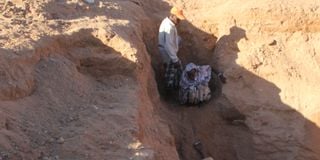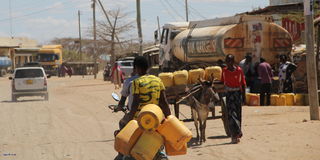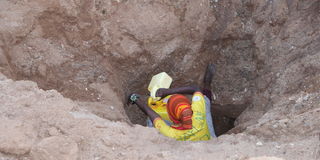Premium
Isiolo residents cry out over biting hunger

Youngsters risk their lives in search of scarce water at the dry riverbed of Toggoi seasonal river in Sericho Ward, Isiolo County. Isiolo residents have complained over biting hunger and called for food aid.
Isiolo residents have asked Governor Abdi Ibrahim Guyo to cushion them against the effects of the drought ravaging the region.
Recent data from the National Drought Management Authority (NDMA) shows that more than 145,000 residents (54 percent of the county’s population) are in dire need of food.
The county government, residents said, should come up with a contingency plan to ensure hunger-stricken families get food and clean water.
Mr Boniface Mwenda, a hawker, said life has become unbearable due to skyrocketing food prices at local markets.
“The price of maize and beans is relatively high, so is that of other commodities. We are living hand to mouth. We cannot afford three meals daily,” the trader said.

Water searching has almost become the main daily chore for residents of Modogashe location in Isiolo County.
A kilo of maize and beans goes for Sh90 and Sh150 respectively.
Water sources have dried up and animals are emaciated due to water and forage shortages, with residents forced to walk long distances in search of the commodity.
Reduced milk production due to depletion of pastures has been blamed for increasing malnutrition rates among mothers and children.
Mr Huka Godana, a herder, proposed a livestock offtake programme to cushion livestock keepers and salvage emaciated animals.
“We have heard the government say repeatedly that it is buying weak animals, but we have never benefited. We appeal to the governor to scale up efforts to mitigate the effects of drought so that we don’t incur more losses,” he said.
An emaciated cow that would sell for Sh25,000 two months ago now goes at Sh20,000, with some markets, especially in remote areas, seeing lower prices. A goat sells at Sh2,800, Sh500 less than it was in August.
A report from the Kenya Meteorological Department shows the county, whose drought situation is in the alarm stage, will receive below normal rains, meaning the situation could deteriorate further.

A 14-year-old girl fetches water from a 20-feet sand dam at Toggoi seasonal river near Modogashe Town in Isiolo County. Young people are risking their lives to get the precious commodity for domestic use as drought ravages the region.
Residents complained that some needy residents were left out of the government’s relief food distribution, exposing them to suffering.
“The governor should intervene through the special programmes department and help us out because the majority of us hardly receive government assistance,” Ms Evelyn Rukia said.
She asked local non-governmental organisations to scale up their support and prioritise mitigating the effects of drought.
Leaders from Northern Kenya recently asked President William Ruto to declare the drought a national disaster and cushion the communities in the region.
Deputy Governor James Lowasa last week said the county government would start distributing food to hungry residents.
Dr Lowasa said when he received relief food from the national government that the county would continue to partner with local NGOs in pooling resources and reaching out to needy families.
“We have brought on board various partners for co-planning, funding and monitoring of the drought interventions for maximum results,” he said.





